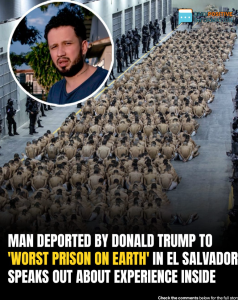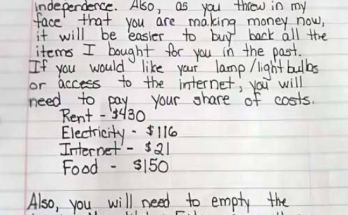Man Sent to El Salvador’s Harshest Prison Under Trump-Era Policy Tells His Story
When Miguel Hernández crossed the U.S. border in 2019 with a frayed backpack, his daughter’s favorite teddy bear tucked inside, he thought he was finally bringing his family to safety. But instead of sanctuary, Miguel’s journey ended in a prison cell thousands of miles away—in El Salvador’s infamous Tecoluca Mega Prison, a brutal facility known for housing the country’s most dangerous gang members.
Deported under the Trump administration’s controversial “Remain in Mexico” and asylum fast-track policies, Miguel’s story became a chilling example of what can happen when immigration policy is enforced with little regard for individual circumstances.
Now free after years behind bars, Miguel is telling his story.
A Life Fleeing Violence
Miguel grew up in Soyapango, a working-class neighborhood of San Salvador that had long been plagued by gang violence. He kept his head down, worked long hours as a mechanic, and tried to protect his wife and daughter from the chaos brewing outside their front door.
But in 2018, the danger became personal. A local gang extorted Miguel, demanding a monthly “tax” to keep his shop open. When he refused, they beat him in front of his daughter and threatened to kill them both.
With little time and even fewer options, Miguel made the difficult choice to flee. They crossed Guatemala and Mexico, eventually arriving at the U.S. border in late 2019, where Miguel hoped to claim asylum.
Caught in the Crackdown
But what Miguel didn’t know was that he had arrived at the height of the Trump administration’s harshest immigration crackdown. Under the Migrant Protection Protocols (MPP), asylum seekers were forced to wait in Mexico while their cases proceeded. Those deemed ineligible—or deemed suspicious without due process—were rapidly deported, sometimes without a hearing.
Miguel barely had time to explain his story before he was labeled a “security concern” and bundled onto a plane headed back to El Salvador.
“They treated me like I was a criminal,” Miguel said. “They didn’t let me speak. They said I was a gang member because of where I was from.”
Worse still, once deported, the Salvadoran government—under pressure from U.S. intelligence-sharing agreements—detained him on the spot. He was accused of affiliation with MS-13, a charge he had never faced before and strongly denies.
“I had no tattoos, no arrest record. Nothing. But I was from Soyapango. That was enough.”
He was transferred to Tecoluca, officially called the Terrorism Confinement Center, a newly built mega-prison the Bukele administration had designed to “crush gangs.” Journalists and human rights groups were banned from entering. Inmates were kept in overcrowded cells, often without sunlight, running water, or medical attention.
Miguel had never held a gun, never committed a violent act. But he was treated as if he had.
Hell Inside Tecoluca
What followed were three years of brutality, deprivation, and psychological torment.
“They shaved our heads. Gave us one meal a day. Sometimes not even that. No visits. No phone calls. My wife didn’t even know if I was alive.”
He recalls seeing men beaten for speaking out of turn, or for crying out in pain. Some went mad. Some disappeared. “At night, you could hear people screaming. And in the morning, someone would be gone.”
Miguel found strength in prayer and in the memory of his daughter. “Every day I would repeat her name—Lucía—so I wouldn’t forget how to feel.”
He shared a cell with over 100 men. One toilet. No soap. He watched as older inmates died from infection, and younger ones turned violent just to survive.
“I never thought I would live to tell this story,” he said. “Every day, I thought I would die.”
A Flicker of Hope
In 2023, under international pressure and after a sweeping review of detainee files, Miguel’s name came up. His case had no supporting evidence. A human rights attorney in El Salvador, who had once heard his name through a church outreach program, helped push for his release.
Miguel was finally freed in January 2024, weak and thin, his teeth rotted from malnutrition. He returned to Soyapango, only to discover his wife and daughter had managed to reach the U.S. with the help of relatives.
“She thought I was dead. She said she had prayed every day for a miracle.”
Now, Miguel is rebuilding his life. He works odd jobs, lives with distant cousins, and is trying to gather documents to re-apply for asylum—this time with a better understanding of the system, and legal help from abroad.
He speaks in churches and community centers, sharing what he endured. “I tell people, don’t give up hope. But also—don’t believe that justice comes easily. You have to fight for it.”
A Larger Legacy
Miguel’s story is just one of many. A 2022 UN report found that hundreds of Salvadoran deportees were detained or killed upon return, often misidentified as gang members based solely on neighborhood or appearance.
Critics of Trump-era immigration policy argue that the system too often failed to distinguish between victims and perpetrators. Human Rights Watch called it a “pipeline of persecution,” where vulnerable people were returned to countries they had risked everything to flee.
In 2025, a bipartisan bill is now under debate to create independent asylum screening panels to prevent such wrongful deportations.
Miguel hopes that sharing his story might contribute to change.
“I don’t want pity. I want people to understand what happens when we are judged by where we’re from, not who we are.”
Epilogue
Today, Miguel keeps a photograph of Lucía by his bed, next to a worn Spanish Bible. He writes to her every week, even though she cannot yet write back.
“I lost years I can never get back,” he says quietly. “But I still have hope. I still believe I will see my daughter again. And when I do, I will tell her that her father didn’t give up.”

